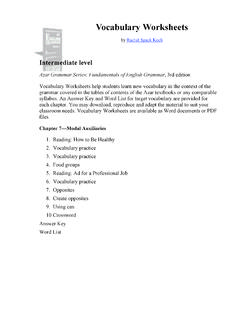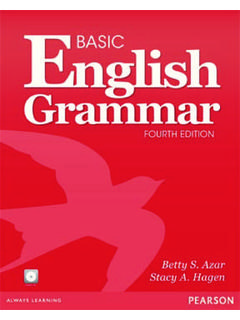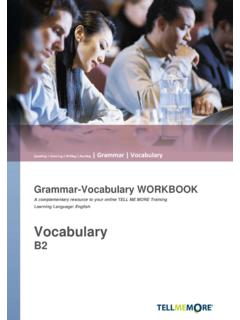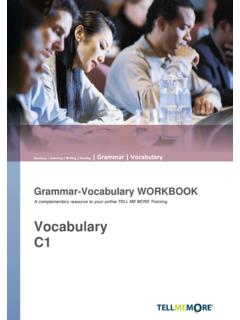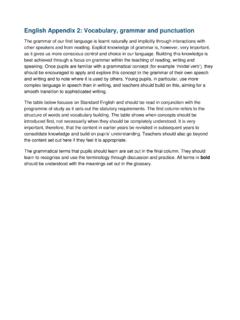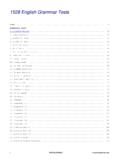Transcription of English Grammar and Vocabulary Impact Course Syllabus
1 English Grammar and Vocabulary Impact Course Syllabus 1) Noun & pronoun 2) Verbs (Lexical& Auxiliary). 3) Verb Tenses 4) Adjectives & Adverb 5) Preposition 6) Conjunction, Phrases and Clause 7) Sentence Types 8) Transformations 9) Word meanings, synonym, antonym 10) Root words, one word substitutes 11) Phrasal Verbs, Idioms 12) Word games Vocabulary development NOUN. RULE: Nouns are names of persons, animals, things and places. EXAMPLE: This is a story about a child called Lily and a crocodile called Dill. EXERCISE: Underline the nouns in the following sentences: 1. Disa was a frog which lived in the field. 2. The women were washing their clothes in the river.
2 3. Bour was the king whose beloved daughter had drowned. 4. The child called Guddy had gone to collect wood near the grassland. 5. Lalu asked Nadim to take the basket from Hyderabad for his parents. RULE: Proper and Common Nouns A person's/animal's name or a specific place is a proper noun while a noun which names a general category of persons, places, animals or things is a common noun. EXERCISE: Say whether the nouns you have underlined above are proper nouns or common nouns. RULE: Collective noun is a single word representing a group. EXAMPLE: A flock meaning a group of sheep A herd meaning a group of animals EXERCISE: Match the collective nouns with their groups.
3 1. Crowd A group of sailors in a ship 2. Swarm A group of sportspersons 3. Team A group of people 4. Crew A group of lions 5. Pride A group of bees/insects EXERCISE: Give suitable collective nouns: 1. A group of cattle 2. A group of wolves 3. A group of ants 4. A group of people watching a play 5. A group of angry people EXERCISE: Make sentences with all the above collective nouns. RULE: Abstract Nouns express feelings, emotions or name those things which cannot be seen. EXAMPLE: Hunger is the best sauce. EXERCISE: Underline the Abstract Nouns in the following Sentences 1. You should aim for personal growth. 2. He is well-known for his intelligence. 3. Laughter is the best medicine.
4 4. People admire wisdom and bravery. 5. This is a very serious illness. RULE: Noun: Number Nouns can be used as singular (one) and plural (more than one): EXAMPLE: Student (singular) students (plural). Box (singular) boxes (plural). RULE: Irregular Nouns: Nouns which do not follow the regular pattern (addition of s' or es') of forming plurals. EXAMPLE: Given below are 10 categories of plural formation applicable to irregular nouns. I. -us' changes to -i'. a. Alumnus alumni b. Fungus fungi c. Stimulus stimuli II. -is' changes to -es'. a. Analysis analyses b. Basis bases c. Crisis crises III. -ix' changes to -ices'. a. Appendix appendices b. Index indices c. Matrix matrices IV.
5 -a' changes to -ae'. a. Antenna antennae b. Formula formulae c. Vertebra vertebrae V. -ouse' changes to -ice'. a. Mouse mice b. Louse lice VI. -en' is added a. Child children b. Ox oxen c. Man men VII. End is altered to a'. a. Curriculum curricula b. Medium media c. Stratum strata VIII. Same form for both singular and plural a. Sheep sheep b. Fish fish c. Deer deer IX. Inner vowels oo' change to ee'. a. Foot feet b. Goose geese c. Tooth - teeth EXERCISE: Rewrite the following using the plural forms of the nouns given in brackets: 1. Poetry is a part of the (curriculum) at different levels. 2. Ivory is made from the elephant's (tooth). 3. Do you know to which (stratum) of society the workers belong?
6 4. The grain has been eaten by the (mouse). 5. Have you mastered all the mathematical (formula)? RULE: Count and Non-count Nouns: Nouns which have a singular and plural form that which can be counted as one or more are called count nouns. Nouns which cannot be so counted are non-count. All nouns in the Noun Number exercise are Count nouns. EXAMPLE: (Non-count): water, milk, oil, money, work, kindness, etc. EXERCISE: Make a list of 10 non-count nouns and make sentences with them. RULE: Noun-Case: Possessive Case is when two nouns come side by side to indicate that one noun belongs to the other EXAMPLE: This is a student's notebook. EXERCISE: Write the following in the possessive form: 1.
7 A hostel where girls stay 2. A life like that of a dog 3. The birthday of my friend 4. Poetry written by Keats 5. A house belonging to the brothers of my father RULE: Noun-Gender Masculine, feminine, neuter and common are the 4 genders in English nouns. EXAMPLE: Father and mother took the children and the pet to their cousin's house. Father Masculine Mother Feminine Pet Neuter Children, cousin Common EXERCISE: Identify the Gender of the underlines nouns: 1. Students should not come late. 2. Some boys are needed to complete this work. 3. I have invited my friends today. 4. Plants do not grow without water. 5. The lady needs a doctor urgently. EXERCISE: Change the Gender of the Underlines from Masculine to Feminine or visa-versa 1.
8 The lion is the king of the forest. 2. They were very fond of their daughters. 3. Their uncle lives in London. 4. He brings gifts for his nephews. 5. My brother is returning today. PRONOUN. RULE: Personal Pronoun Words used for replacing nouns or for performing the function of nouns in a sentence. EXAMPLE: This story describes a new place. It describes a new place. People live on the sea coast. They live on the sea coast EXAMPLE: List of personal pronouns: Person Subj- Subj - Obj - Obj Poss Adj Poss Adj Poss Poss Singular Plural Singular Plural - - Plural Pron - Pron - Singular Singular Plural First I We Me Us My Our Mine Ours Second You You You You Your Your Yours Yours Third- Mas He Him His His Fem She They Her Them Her Their Hers Theirs Neut It It Its Its EXERCISE: Replace the underlined with suitable personal pronouns: 1.
9 Ghana was the first country in Africa to get independence. 2. The citizens rejoiced when they got independence. 3. Gold Coast was the rulers' way of describing it. 4. The tribal chief wanted the country to be free. 5. The country's resources are very rich. 6. Most families trusted their leader. 7. Nelly's ideas were very good. 8. A woman does the job of cooking in this hotel. 9. A bullock helps the farmer in the field. 10. Hilton is the best place for this group of tourists. RULE: Possessive Pronouns: pronouns which are used to replace nouns in the possessive case are called possessive pronouns. EXAMPLE: This poem is Shelley's poem. This poem is his poem. EXPLANATION: (Here his' replaces the possessive noun but since it is followed by another noun it's function is like an adjective and not like a pronoun therefore it is a possessive pronoun used as an adjective).
10 EXAMPLE: This poem is his. EXPLANATION: (Here his' replaces both the possessive noun and the object noun and functions as the object of the sentence therefore it is a possessive pronoun used as a pronoun). EXAMPLE: List of possessive pronouns: Person Pronoun used as Pronoun used as Pronoun used as Pronoun used as Adjective Adjective Pronoun Pronoun (plural). (singular) (plural) (singular). First person My Our mine ours Second person Your Your yours Yours Third person Masculine his his Feminine her } their hers } theirs Neuter its --- EXERCISE: Choose the correct pronoun from those given in brackets: 1. (My/mine) dog is (my/mine) companion. 2. I have lost (my/mine) pet; can I borrow (your/yours)?


